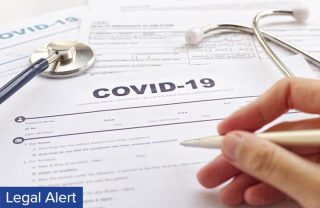Rebuttable Presumption of Workers Compensation Eligibility
Against the objections of dozens of trade associations and hundreds of businesses including CEMA and our members, Governor Lamont decided to issue an Executive Order (EO) to allow employees who contracted COVID-19
This order has broad and new presumptions, requirements and processes that will impact employees and employers. The goal of the EO is to allow all essential workers who contracted COVID-19 between March 10 and May 20 of this year to claim all benefits through the workers’ compensation system.
Below is an overview and summary for you to review. Please be sure to read through all this material closely so you are aware of the provision of the new order which is effective immediately.
Rebuttable Presumption of Eligibility
The Executive Order sets up a new “rebuttable presumption” that any employee who initiated a claim for workers compensation benefits and who missed a day or more of work between March 10, 2020 and May 20, 2020 due either to a diagnosis of COVID-19 or due to symptoms that were diagnosed as COVID-19, will be determined to have contracted COVID-19 as an occupational disease arising out of and in the course of employment.
 Conditions of the Eligibility for Workers Compensation Presumption:
Conditions of the Eligibility for Workers Compensation Presumption:
- The employee must have worked at the direction of the employer, outside the home during at least one of the fourteen days immediately preceding the date of injury and could not have received an offer or directive from the employer to work from home instead of from his or her place of employment.
- If the date of “injury” was more than fourteen days after March 23, 2020 and the employee was employed by an employer that met the requirements of “Essential Worker” and deemed “Essential” under Gov. Lamont’s Executive Order 7H.
- The employee must have received a confirmed positive lab test within 3 weeks of the date of injury or diagnosed and must have proof of that test documentation was within 3 weeks of the date of injury by a licensed physician, licensed physician’s assistant, or licensed advanced practice registered nurse based on the employee’s symptoms
Additional Eligibility Conditions & Requirements
Also included in the Executive Order is the following conditions and requirements:
- Any workers comp benefits paid will be reduced by the amount of any paid sick leave available to an employee through the Federal Emergency Paid Sick Leave Act (FFCRA P.L. 116-127) or through any other paid sick leave program specifically available in response to COVID-19 and separate from any accrued paid time off regularly available to the employee.

- The eligibility presumption in the Executive Order may only be rebutted if the employer or insurer can demonstrate by a “preponderance of the evidence” that the employment of the individual was not the cause of his or her contracting COVID-19 (onus to disprove shifts to the employer).
- The employee must show and prove that the date of injury for the employee who contracted COVID-19 is between March 10, 2020 and May 20, 2020 and that the employee was first unable to work or died due to a diagnosis of COVID-19 or to symptoms that were diagnosed as COVID-19, whichever occurred first.
- Any worker who has contracted COVID-19 but who is not entitled to the presumption under the Executive Order, shall not be precluded from making a traditional workers compensation claim
Non-Discrimination Requirements
The Executive Order also includes the following requirements:
- No employer can discharge, cause to be discharged, or discipline or discriminate against any employee because the employee has filed a claim for workers’ compensation benefits or otherwise exercised the rights afforded to him pursuant to the provisions
- No employer can misinform or otherwise dissuade an employee from filing a claim for workers’ compensation benefits.
- Any employee who is discharged, disciplined or discriminated against or has been deliberately misinformed or dissuaded from filing a claim for workers’ compensation benefits may bring a civil action in the State Superior Court for the reinstatement of his previous job, payment of back wages and reestablishment of employee benefits to which he would have otherwise been entitled if he had not been discriminated against or discharged and any other damages caused by such discrimination or discharge.
- Any employee who prevails in such a civil action shall be awarded reasonable attorney’s fees and costs to be taxed by the court and the court may also award punitive damages
- Any employee may also file a complaint with the chairman of the Workers’ Compensation Commission alleging they were discharged, disciplined or discriminated against or were deliberately misinformed or dissuaded from filing a claim for workers’ compensation benefits and a workers compensation hearing shall be held and the Commissioner may award the employee the reinstatement of his previous job, payment of back wages and reestablishment of employee benefits to which he otherwise would have been eligible if he had not been discriminated against or discharged.
- Any employee who prevails in such a complaint shall be awarded reasonable attorney’s fees. Any party aggrieved by the hearing decision of the commissioner may appeal the decision to the Appellate Court.
